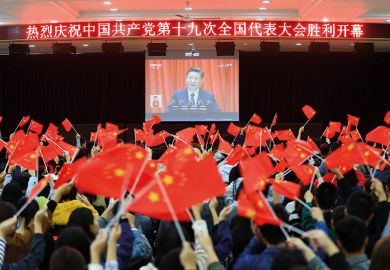China’s universities have made an “impressive” and “fundamental” change in their research strategies by investing much more in long-term basic research, the president of Asia’s top university has said.
Tan Chorh-Chuan, who will step down later this month after serving as president of the National University of Singapore for nine years, told university leaders in London that he believed that the noticeable shift towards fundamental research would aid China’s entrepreneurial ambitions as well as its research goals.
Delivering the Higher Education Policy Institute’s annual lecture on 7 December, Professor Tan pointed out that “historically, [China’s research and development funding] has been directed mainly at shorter-term developmental and applied research with only a small proportion targeted at basic research”.
For instance, according to figures published last year in Nature, China spent just 4.7 per cent of its R&D budget on basic research in 2013, compared with France’s 24.1 per cent and the US’ 17.6 per cent, said Professor Tan, whose university was ranked 22nd in the latest Times Higher Education World University Rankings.
“More recently, however, the scale of investment in basic research has been increased very substantially, with the specific aim of building long-term fundamental research strengths that would position China for the future,” said Professor Tan, who observed that the “long-term direction of travel for R&D [in China] was quite impressive” and “represented a fundamental change for most universities”.
Having increased its R&D expenditure by 23 per cent a year, China was “now on track to be the world’s top R&D spender by 2019”, he said, although the country’s citation rate still lags behind the world average.
In key fields such as data science, artificial intelligence and cybersecurity, there had been a “marked reduction in the time and ‘distance’ between a fundamental research discovery and its high-impact application and/or commercialisation”, which has further fuelled the investment in basic research, Professor Tan said.
The result has been a “greater interest and focus among universities to translate and commercialise their research and technology”, he explained.
China now had an ambition to establish 1,000 business incubators based around university research by 2021 and a further 50 internationally, most likely within neighbouring countries, Professor Tan said.
One such incubator at Tsinghua University had been given financial backing worth $7.5 billion (£5.6 billion) – about 10 times the university’s research budget – to establish 500 start-ups, he explained.
Like Singapore’s government, China had now recognised that universities represented a “sweet spot” between academic and commercial imperatives because they “have the talent – both faculty and students – and research strengths, that through the commercialisation of intellectual property, start-ups and collaborations with industry, can create new products, innovations and services and [develop] industry clusters in the country,” Professor Tan said.
“We are in the foothills of this…but there are some very interesting possibilities,” he said.
Register to continue
Why register?
- Registration is free and only takes a moment
- Once registered, you can read 3 articles a month
- Sign up for our newsletter
Subscribe
Or subscribe for unlimited access to:
- Unlimited access to news, views, insights & reviews
- Digital editions
- Digital access to THE’s university and college rankings analysis
Already registered or a current subscriber?










